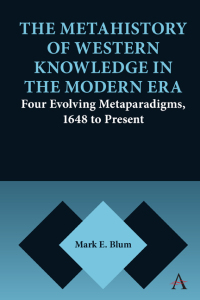Buy The Metahistory of Western Knowledge in the Modern Era: Four Evolving Metaparadigms, 1648 to Present 1st Edition PDF ebook by author Mark E. Blum – published by Anthem Press (NBN) in 2021 and save up to 80% compared to the print version of this textbook. With PDF version of this textbook, not only save you money, you can also highlight, add text, underline add post-it notes, bookmarks to pages, instantly search for the major terms or chapter titles, etc.
You can search our site for other versions of the The Metahistory of Western Knowledge in the Modern Era: Four Evolving Metaparadigms, 1648 to Present 1st Edition PDF ebook. You can also search for others PDF ebooks from publisher Anthem Press (NBN), as well as from your favorite authors. We have thousands of online textbooks and course materials (mostly in PDF) that you can download immediately after purchase.
Note: e-textBooks do not come with access codes, CDs/DVDs, workbooks, and other supplemental items.
eBook Details:
Full title: The Metahistory of Western Knowledge in the Modern Era: Four Evolving Metaparadigms, 1648 to Present 1st Edition
Edition: 1st
Copyright year: 2021
Publisher: Anthem Press (NBN)
Author: Mark E. Blum
ISBN: 9781785276989, 9781785277009
Format: PDF
Description of The Metahistory of Western Knowledge in the Modern Era: Four Evolving Metaparadigms, 1648 to Present 1st Edition:
The book is a study of the evolving history of knowledge in the arts and sciences in the modern era – from 1648 through the present. Modernism is treated as an epoch with evolving disciplines whose articulated problems of a time and the inquiry methods to address them, develop in a coordinated manner, given a mutual awareness.
When one organizes the development of knowledge over periods of years, and gives it an appellation such as “Modernism,” the organization of facts is guided by concepts and values discerned throughout these periods. These facts of knowledge development share sufficient understandings to be called an “era,” or an “epoch,” or other terms that insist on the shared aspects of those years. One can call such an effort a “metahistory,” in that what is tracked is not merely a knowledge that is political, economic, ideological, sociological, or scientific, but an overview that tracks the respective conceptual developments of the fields in how they have changed and augmented their problem formulations, inquiry methods, and explanatory conceptions over time.





